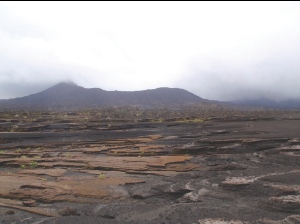 With a history of 25 hurricanes, 21 volcanic activity events, three earthquakes and three gales in the past 26 years, Vanuatu has been able to document the impact of disasters upon the country’s development, and determine areas where future spending should take place.
With a history of 25 hurricanes, 21 volcanic activity events, three earthquakes and three gales in the past 26 years, Vanuatu has been able to document the impact of disasters upon the country’s development, and determine areas where future spending should take place.
At the recently held SPC/SOPAC Division’s 3rd Session of the Pacific Platform for Disaster Risk Management, the high-level discussions included disaster risk financing and a pilot insurance project.
As an immediate outcome of the Platform, a joint SPC/SOPAC Division - World Bank mission to Vanuatu has taken place to further develop these discussions. During his dialogue with the mission representatives, the Hon. Moana Carcasses, Minister of Finance and Economic Management expressed Vanuatu’s interest in participating in the pilot Pacific Disaster Risk Financing and Insurance Programme.
During the Platform held in Auckland, New Zealand earlier this month, the Vanuatu representatives agreed that cooperation and coordination are the keys to the progress already made in the National Action Plan for Disaster Risk Management.
The members of the Vanuatu contingent at the Platform were Ms Antonneth Arnhambat of the Treasury Department; Mrs Esline Garaebiti Bule, Vanuatu Meteorology and Geohazards Department (VMGD); Mr Jean-Francois Metmetsan, Prime Minister’s Office, and Mr Salesa Kaniaha of Vanuatu Meteorology and Geohazards Department.
“Vanuatu recognises the importance of coordinating the work of policy and finance, and in 2006 was the first Pacific Island country to begin the integration of Disaster Risk Management as a part of national planning,” explained Ms Arnhambat. “Policy and Finance work together to manage and mitigate risks and we have an integrated budget system in place.”
The Vanuatu Government has allocated VT25 million for a fund that can be accessed quickly in the time of a disaster. In addition, there is a contingency budget for a maximum of 1.5% of the total budget to be released in response to a natural, health or financial disaster.
The framework for the Vanuatu Disaster Risk Management Plan was also a part of the commitment to streamlining and cooperation made when the National Action Plan was first designed, and “As a result, the VMGD and the National Disaster Management Office (NDMO) are now housed together in a new complex, fully funded by the Vanuatu Government.
VMGD’s Mrs Garaebiti said that this was a welcome change, as “One of our weaknesses was having agencies all spread out, not making it easy to respond in times of disasters. It took time, in a tsunami warning for example, to go from the Geohazards Section to the Meteorological Office to advise them, ‘this is the information we have to put out’.
“Housing us together with the same Director will improve communication and our response time, and we are developing standard operating procedures to streamline our work. We now have a system, in a geohazard state of emergency like a volcanic eruption, where if the data is showing a rapid increase in the activity, we inform the NDMO, and they have their own procedures to initiate the release of funds by the Finance Department for any further operation to manage the crisis,” said Ms Garaebiti.
“Should a disaster strike, there can be potential growth losses, a drastic gap that could cost the country from VT7billion to VT15billion depending on how much we intervene in terms of Disaster Risk Reduction,” added Ms Arnhambat. “We acknowledge that so far we have only budgeted for Disaster Management, but the work by the NDMO on integrating financial planning for Disaster Risk Reduction (DRR) is nearing completion. It is important that we utilise resources in the best way possible.”
“Government is committed to addressing Disaster Risk Reduction, Disaster Risk Management and Climate Change issues, at national, regional and global levels,” said Mr Metmetsan, of the PM’s Office.
The most recent round of discussions with the SPC/SOPAC Division, World Bank mission is a further indication of this commitment.
Photo caption: Volcanic activity as seen from Mt Bennow’s 12 kilometre –wide ash plain on Ambrym Island, Vanuatu.
(Photo courtesy of Samantha Cook.)





